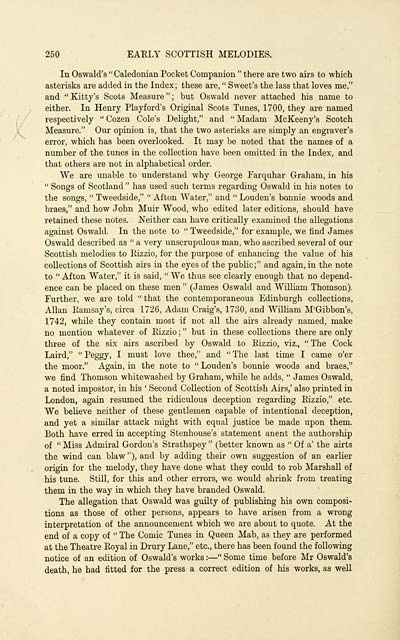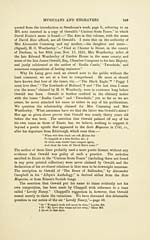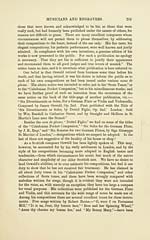Inglis Collection of printed music > Printed text > Early Scottish melodies
(274) Page 250
Download files
Complete book:
Individual page:
Thumbnail gallery: Grid view | List view

250 EARLY SCOTTISH MELODIES.
In Oswald's "Caledonian Pocket Companion " there are two airs to which
asterisks are added in the Index; these are, " Sweet's the lass that loves me,"
and " Kitty's Scots Measure " ; but Oswald never attached his name to
either. In Henry Playford's Original Scots Tunes, 1700, they are named
respectively " Cozen Cole's Delight," and " Madam McKeeny's Scotch
Measure." Our opinion is, that the two asterisks are simply an engraver's
error, which has been overlooked. It may be noted that the names of a
number of the tunes in the collection have been omitted in the Index, and
that others are not in alphabetical order.
We are unable to understand why George Farquhar Graham, in his
" Songs of Scotland " has used such terms regarding Oswald in his notes to
the songs, " Tweedside," " Afton Water," and " Louden's bonnie woods and
braes," and how John Muir Wood, who edited later editions, should have
retained these notes. Neither can have critically examined the allegations
against Oswald. In the note to " Tweedside," for example, we find James
Oswald described as " a very unscrupulous man, who ascribed several of our
Scottish melodies to Eizzio, for the purpose of enhancing the value of his
collections of Scottish airs in the eyes of the public;" and again, in the note
to " Afton Water," it is said, " We thus see clearly enough that no depend-
ence can be placed on these men " (James Oswald and William Thomson).
Further, we are told " that the contemporaneous Edinburgh collections,
Allan Eanisay's, circa 1726, Adam Craig's, 1730, and William M'Gibbon's,
1742, while they contain most if not all the airs already named, make
no mention whatever of Rizzio ; " but in these collections there are only
three of the six airs ascribed by Oswald to Eizzio, viz., "The Cock
Laird," " Peggy, I must love thee," and " The last time I came o'er
the moor." Again, in the note to " Louden's bonnie woods and braes,"
we find Thomson whitewashed by Graham, while he adds, " James Oswald,
a noted impostor, in his ' Second Collection of Scottish Airs,' also printed in
London, again resumed the ridiculous deception regarding Eizzio," etc.
We believe neither of these gentlemen capable of intentional deception,
and yet a similar attack might with equal justice be made upon them.
Both have erred in accepting Stenhouse's statement anent the authorship
of " Miss Admiral Gordon's Strathspey " (better known as " Of a' the airts
the wind can blaw "), and by adding their own suggestion of an earlier
origin for the melody, they have done what they could to rob Marshall of
his tune. Still, for this and other errors, we would shrink from treating
them in the way in which they have branded Oswald.
The allegation that Oswald was guilty of publishing his own composi-
tions as those of other persons, appears to have arisen from a wrong
interpretation of the announcement which we are about to quote. At the
end of a copy of " The Comic Tunes in Queen Mab, as they are performed
at the Theatre Eoyal in Drury Lane," etc., there has been found the following
notice of an edition of Oswald's works : — " Some time before Mr Oswald's
death, he had fitted for the press a correct edition of his works, as well
In Oswald's "Caledonian Pocket Companion " there are two airs to which
asterisks are added in the Index; these are, " Sweet's the lass that loves me,"
and " Kitty's Scots Measure " ; but Oswald never attached his name to
either. In Henry Playford's Original Scots Tunes, 1700, they are named
respectively " Cozen Cole's Delight," and " Madam McKeeny's Scotch
Measure." Our opinion is, that the two asterisks are simply an engraver's
error, which has been overlooked. It may be noted that the names of a
number of the tunes in the collection have been omitted in the Index, and
that others are not in alphabetical order.
We are unable to understand why George Farquhar Graham, in his
" Songs of Scotland " has used such terms regarding Oswald in his notes to
the songs, " Tweedside," " Afton Water," and " Louden's bonnie woods and
braes," and how John Muir Wood, who edited later editions, should have
retained these notes. Neither can have critically examined the allegations
against Oswald. In the note to " Tweedside," for example, we find James
Oswald described as " a very unscrupulous man, who ascribed several of our
Scottish melodies to Eizzio, for the purpose of enhancing the value of his
collections of Scottish airs in the eyes of the public;" and again, in the note
to " Afton Water," it is said, " We thus see clearly enough that no depend-
ence can be placed on these men " (James Oswald and William Thomson).
Further, we are told " that the contemporaneous Edinburgh collections,
Allan Eanisay's, circa 1726, Adam Craig's, 1730, and William M'Gibbon's,
1742, while they contain most if not all the airs already named, make
no mention whatever of Rizzio ; " but in these collections there are only
three of the six airs ascribed by Oswald to Eizzio, viz., "The Cock
Laird," " Peggy, I must love thee," and " The last time I came o'er
the moor." Again, in the note to " Louden's bonnie woods and braes,"
we find Thomson whitewashed by Graham, while he adds, " James Oswald,
a noted impostor, in his ' Second Collection of Scottish Airs,' also printed in
London, again resumed the ridiculous deception regarding Eizzio," etc.
We believe neither of these gentlemen capable of intentional deception,
and yet a similar attack might with equal justice be made upon them.
Both have erred in accepting Stenhouse's statement anent the authorship
of " Miss Admiral Gordon's Strathspey " (better known as " Of a' the airts
the wind can blaw "), and by adding their own suggestion of an earlier
origin for the melody, they have done what they could to rob Marshall of
his tune. Still, for this and other errors, we would shrink from treating
them in the way in which they have branded Oswald.
The allegation that Oswald was guilty of publishing his own composi-
tions as those of other persons, appears to have arisen from a wrong
interpretation of the announcement which we are about to quote. At the
end of a copy of " The Comic Tunes in Queen Mab, as they are performed
at the Theatre Eoyal in Drury Lane," etc., there has been found the following
notice of an edition of Oswald's works : — " Some time before Mr Oswald's
death, he had fitted for the press a correct edition of his works, as well
Set display mode to: Large image | Transcription
Images and transcriptions on this page, including medium image downloads, may be used under the Creative Commons Attribution 4.0 International Licence unless otherwise stated. ![]()
| Special collections of printed music > Inglis Collection of printed music > Printed text > Early Scottish melodies > (274) Page 250 |
|---|
| Permanent URL | https://digital.nls.uk/94646560 |
|---|
| Description | Scottish and English songs, military music and keyboard music of the 18th and 19th centuries. These items are from the collection of Alexander Wood Inglis of Glencorse (1854 to 1929). Also includes a few manuscripts, some treatises and other books on the subject. |
|---|
| Description | The Glen Collection and the Inglis Collection represent mainly 18th and 19th century Scottish music, including Scottish songs. The collections of Berlioz and Verdi collected by bibliographer Cecil Hopkinson contain contemporary and later editions of the works of the two composers Berlioz and Verdi. |
|---|

